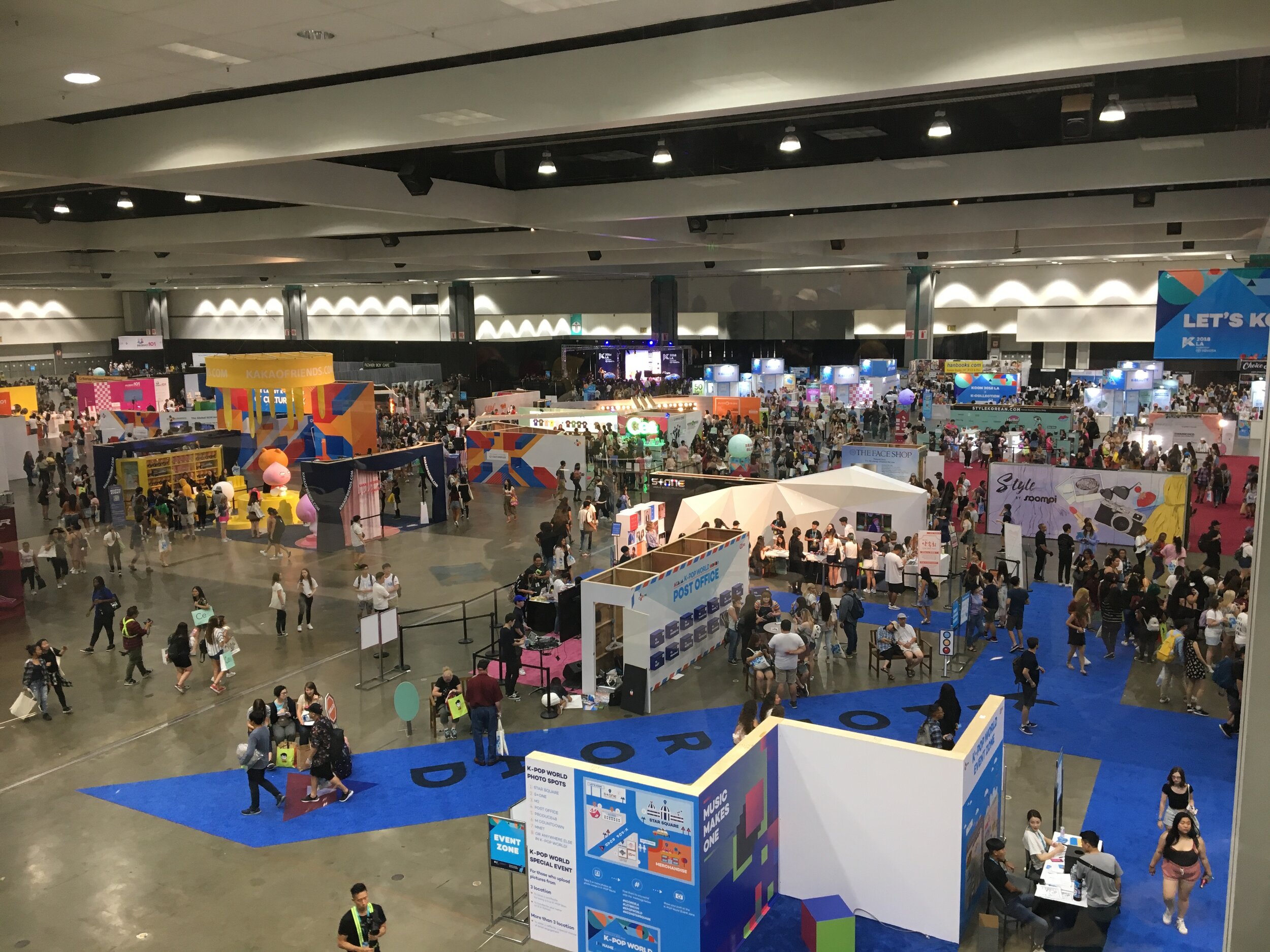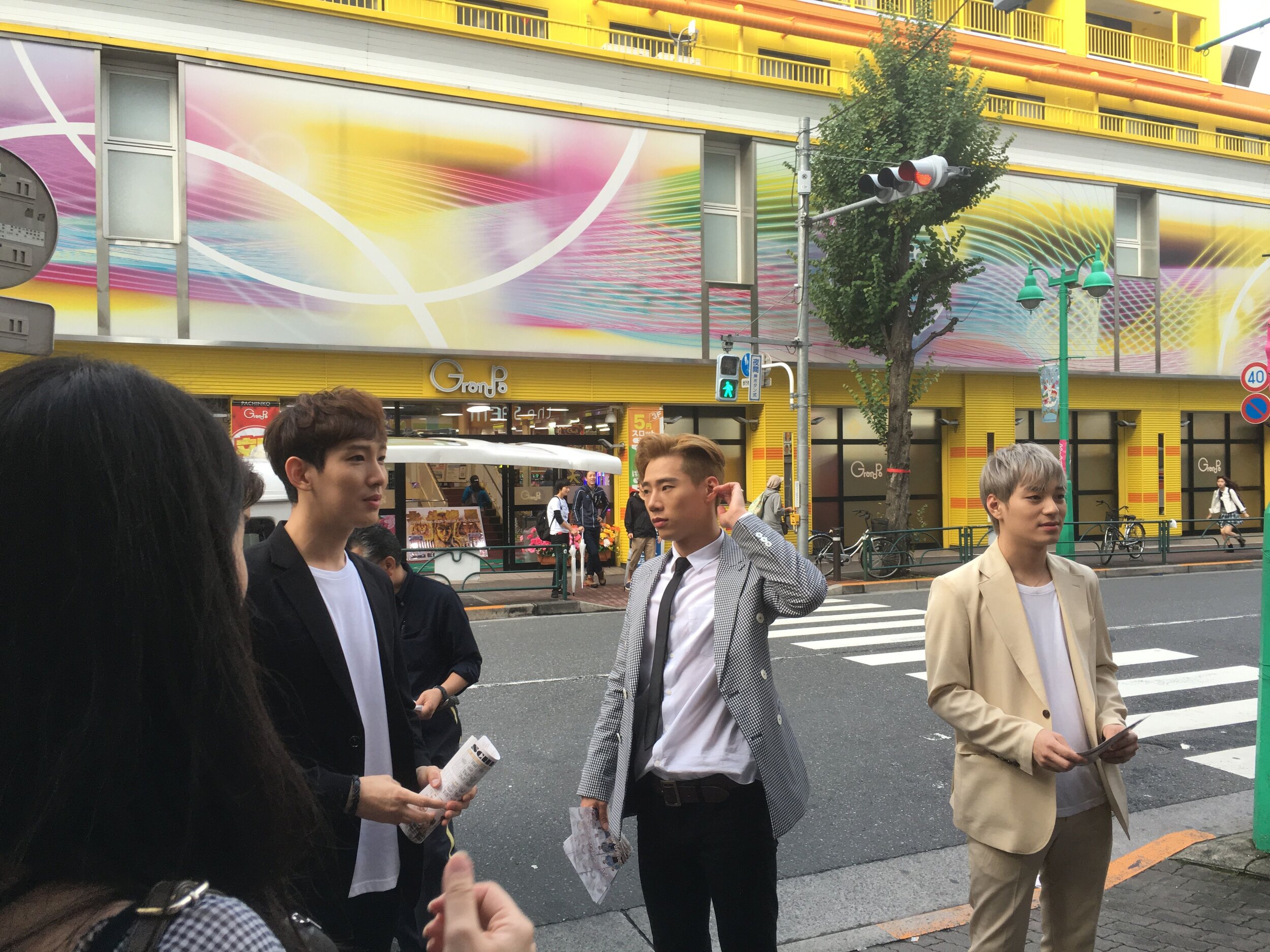Global Fandom Jamboree: Miranda Ruth Larsen (Japan)
/A view of the KCON LA convention floor from the Special Guest lounge (author’s photo, 2018)
In the mid‐2000s, I walked into a music‐based pop culture shop in a Central New York mall and picked up a t‐shirt emblazoned with the words “anime freak” in English and the kanji for “otaku” in Japanese. At the time, Japanese content such as anime and manga were circulating widely in the United States and globally, aided by Web 2.0 and the time and effort of industry and dedicated fans alike. (Larsen 2018, 277) This personal anecdote opens my article “Fandom and Otaku” to marry my argument (fan, like otaku, is a contextually determinant term and identity) with my aca-fan position (an identity position that complicates and enriches fan experiences).
Consider the following situation as an addendum: in the summer of 2015, I returned to Central New York to visit family before moving to Tokyo for my PhD. One of my cousins was especially eager for me to spend time with her daughter, someone also “into” all the “Japan stuff.” Despite our 13-year age gap, this ‘little’ cousin of mine and I shared interests in numerous anime, video games, and Japanese musicians. She was particularly delighted I knew about Hatsune Miku, as many of her friends didn’t understand the concept of the virtual singer. We then had this exchange:
Me: Well, if you see something Miku that you want to get, I can always send it to you
from Tokyo.
Little cousin: Oh, that’s okay. I can get everything on Amazon.
The sting of rejected good intentions aside, this moment encapsulates a generational difference of engagement with Japanese popular culture and fandom itself. I cite it now in conjunction with my statement in “Fandom and Otaku” as an apt illustration of the many strains found in fandom and fan studies. Transcultural fandom is at the root of global fan practices today, facilitated by international marketing and connections via Web 2.0. At the same time, this focus on the globalization of certain texts and practices often elides critical localized realities.
My dissertation, “‘A World Just For You’: Affect, Bodies, and Place in Shin-Ōkubo,” explores this via K-pop. While widely understood as a global phenomenon, the experience of K-pop fandom and idoldom in Tokyo’s Koreatown is vastly different from other locations. Besides a complex historical backdrop and cultures of gendered consumption writ large, categories of ‘fan’ and ‘idol’ are often spatially bound performances. Affective experiences offered as integral components of nascent idol life, such as sharing photos, recording “Five Minute Dates,” and tackling language barriers facilitate co-present co-creation specific to certain locales. Koreatown’sIkemen-dori(“Hot Guy Road”), for example, has idols recruit new fans via hand-delivered flyers in an environment of ethnic tourism clouded by an unwillingness to remember Japanese atrocities against Korean nationals both historical and present (Ahn and Yoon 2020, 179). Critically, this localized model influences idols who go on to operate elsewhere, including participation in production of other idols in For
Rookie K-pop group CIRCUS CRAZY distributes flyers on the streets of Shin-Ōkubo, Tokyo’s Koreatown (author’s photo, 2016).
The recognition of the global in fan studies often fades to discussions of adaptation, distribution, and objects. My dissertation highlights how numerous fan experiences can’t be purchased via Amazon. Elsewhere, I’ve written about affective hoarding, a phenomenon where fans actively seek to take an affective experience away from another fan (Larsen 2018, On/Offscreen). While adaptation, distribution, and object fandom matter, fan studies has much work to do recognizing the polymorphous. Like the earlier abandonment of purely affirmational, resistance-driven fandom, we must now accept that the digital and global turn facilitates anti-fandom and toxic stan culture on a borderless and terrifying scale.
I’m interested, then, in how scholarship can better represent the realities of fandom, addressing the non-utopian (racism, sexism, classism, ageism, nationalism, xenophobia) and the complex (transcultural, linguistic, affective, commoditized). Disparities in academia at large and academic publishing guarantee widely circulated texts are often vetted via academia, not fandom. Critical views of BIPOC scholars – and other underrepresented populations – are curated for acceptability by a white majority that gets to represent the field in classrooms and revenue. It’s unsurprising, therefore, that voices offering the hardest truths are often dismissed – and harassed -- if they do not fit the narrative (Stitch 2021).
Similarly, the aca-fan orientation, outside of many welcoming circles, is criticized as an unethical position denoting excessive attachment. As Lori Hitchcock-Morimoto observes, “we are wont to think of the emotional side of fandom as both incalculable (and thus difficult to account for) and insufficiently critical as a scholarly lens, particularly where positive emotions are concerned” (2017). In my own experience while based in Tokyo, I frequently encountered pointed stares whenever I framed my work as aca-fandom or reported fans and idols as having diverse experiences. Again, this is contextual; white cis male academics engaging with ‘weird Japan’ aren’t undercut in the same manner. There is a marked gender bias as to who is an acceptable aca-fan, among many other factors. This is not discussed enough.
Returning to my opening anecdotes, I want to stress the rural setting of these experiences as well. Media and experiences may be theoretically widely available, but they are not widely accessible. As I often explain when questioned about my research, K-pop idols do not offer the same proximities – real and imagined – to fans in Tokyo as they do in Los Angeles. And as I told my little cousin back in 2015, utilizing a fannish reference, one does not simply purchase everything on Amazon.
I believe fan studies, to capture the realities of fandom, must recognize the numerous gaps between fans far beyond the narrative of a global fandom rallying behind a boyband, film, or athlete. We must update – and create new -- models that address the diversity and inequities of fan experiences and then discuss these models beyond the halls of academia. Most importantly, we must reckon with context upsetting generalized assertions.
Works Cited
Ahn, Ji-Hyun and E Kyung Yoon. 2020. “Between Love and Hate: The New Korean Wave, Japanese Female Fans, and Anti-Korean Sentiment in Japan.” Journal of Contemporary Eastern Asia Vol. 19., No. 2: 179-196.
Hitchcock-Morimoto, Lori. 2017. “’First Principles’: Hannibal, Affective Economy, and Oppositionality in Fan Studies.” Fan Studies Network Conference, Huddersfield UK.
Larsen, Miranda Ruth. 2018. “Affective Hoarding.” On/Offscreen.
--- 2018. “Fandom and Otaku.” A Companion to Media Fandom and Fan Studies. Paul
Booth, ed. Wiley-Blackwell.
Stitch. 2021. “Over a Year After the OTW/AO3’s Statement of Solidarity: Where Are We With That Anti-Racism?” Stitch’s Media Mix.
Miranda Ruth Larsen is a PhD Candidate at the University of Tokyo in ITASIA (Information, Technology, and Society in Asia). She previously earned an M.A. in Cinema & Media Studies (2015) from UCLA and a B.A. in English & Textual Studies (2011) from Syracuse University. Miranda’s work focuses on fandom, gender, and transcultural media. She is the author of “‘But I’m a Foreigner Too.’ – Otherness, Racial Oversimplification, and Historical Amnesia in Japan’s K-pop Scene” inFandom, Now in Color: A Collection of Voices(2020), “‘Don’t Adjust Your Life to Mine.’ –Moon Child, Homoeroticism, and the Vampire as Multifaceted Other” inThe Global Vampire in Popular Culture(2020), “Fanservice” in the open-access publicationKeywords: Japanese Media and Popular Culture(2020), among others. She has discussed K-pop fandom on podcasts such as Aca-Media, Reset, and Hello Hallyu and was a three-year KCON LA Special Guest. She can be found on Twitter as @AcaOtaku



